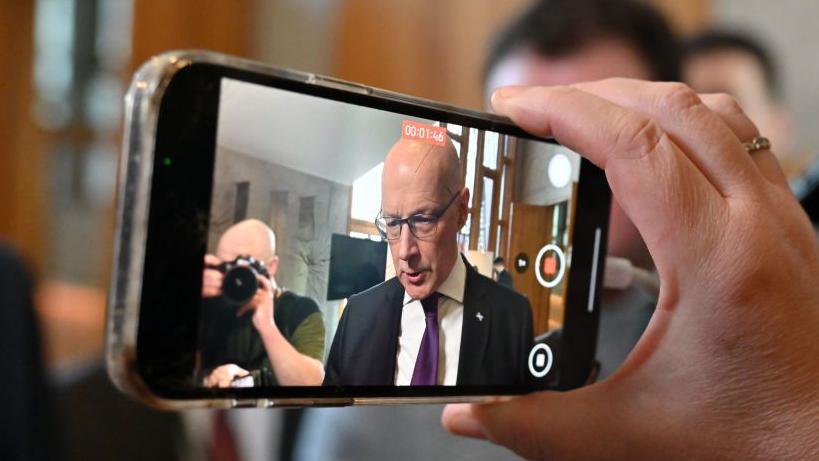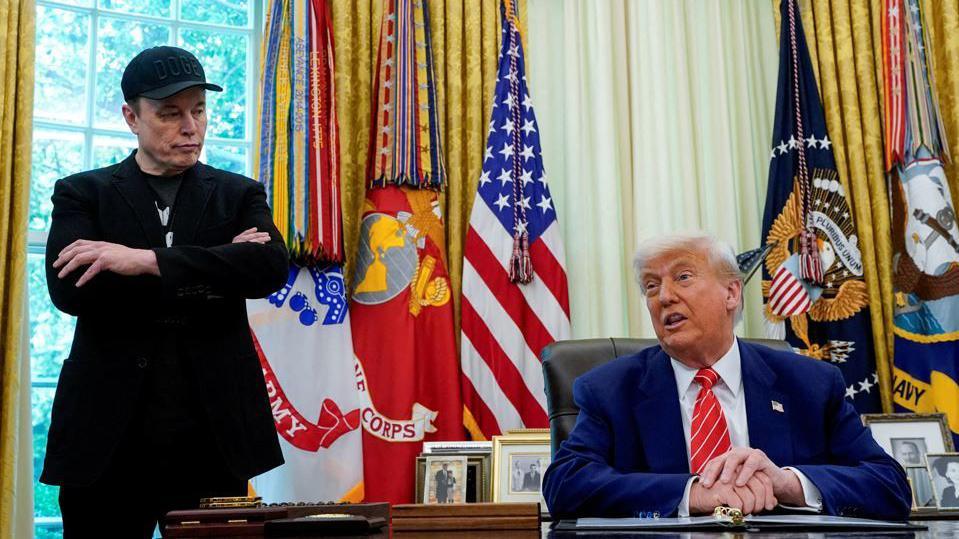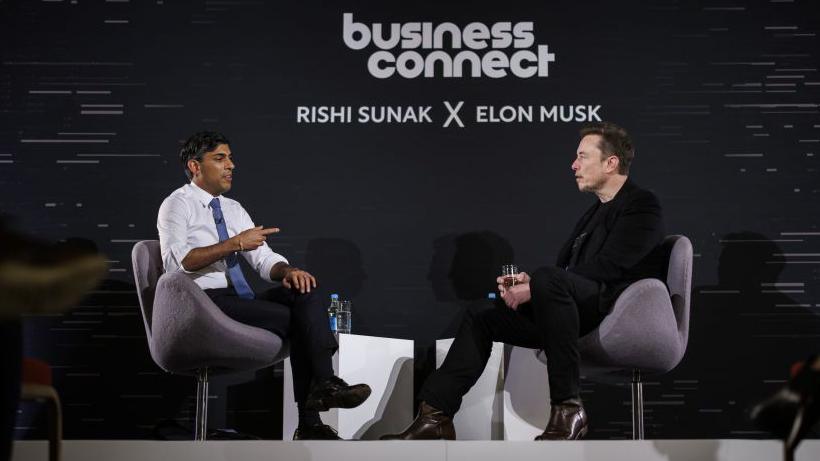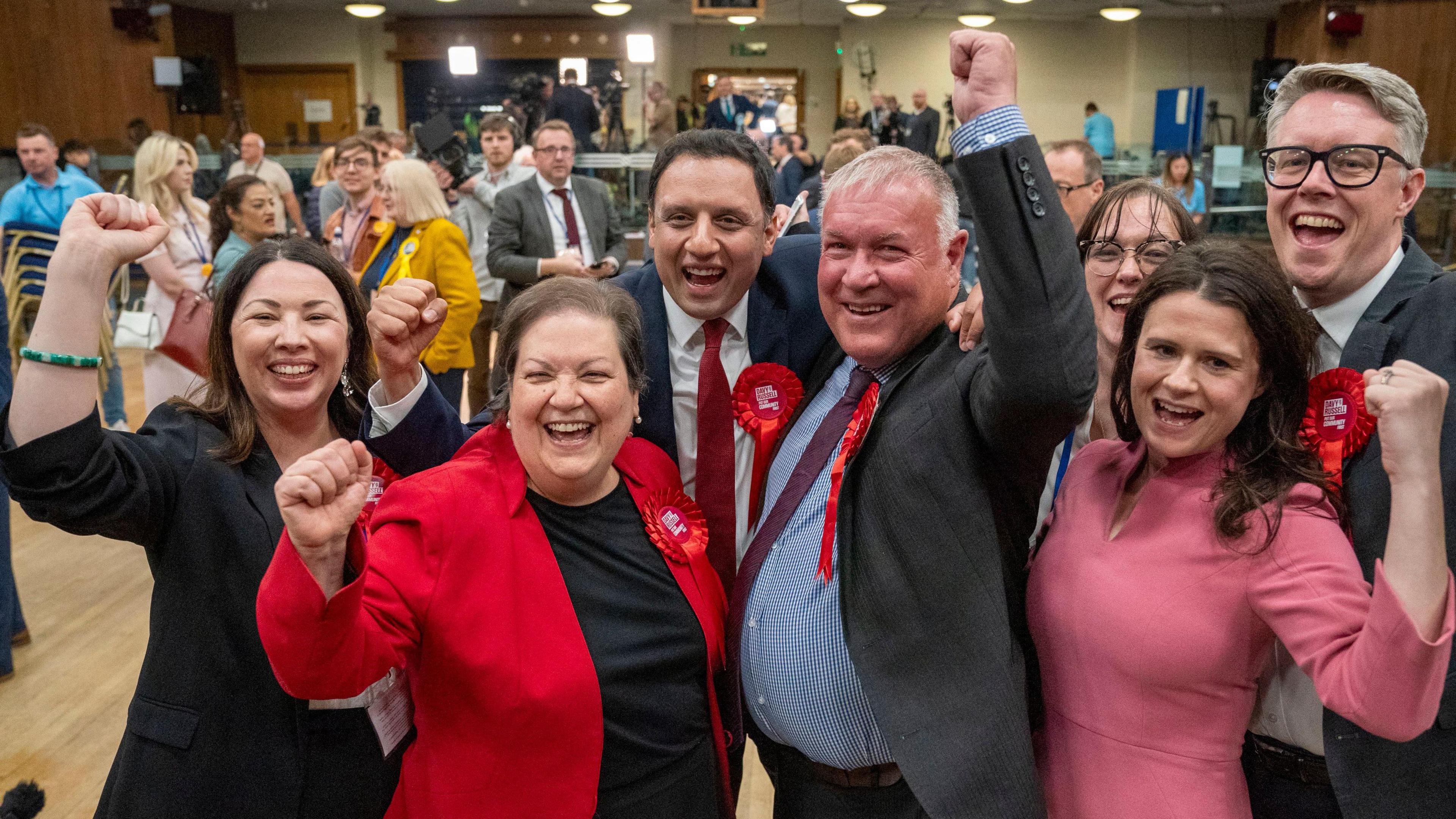Is social media warping Scottish political debate?

John Swinney says his government is considering whether to keep posting on X
- Published
John Swinney is reviewing whether he and his government will continue to use social media app X, after raising concerns about its owner's "malign influence" on the public debate.
The SNP was an early adopter of data-driven campaigning and has spent thousands on social media adverts over recent years.
But the first minister has questioned whether the likes of X - which has widely been seen to shift to the right under the leadership of Elon Musk - are affecting political discourse in the UK.
He is wading into philosophical waters - does social media hold up a mirror to society, or does it produce a warped reflection which poisons the well of public debate?
And can Swinney afford to turn his back on a key platform ahead of an election, given the importance of social media in modern political campaigning?
Swinney considering use of X over 'reprehensible' Musk remarks
- Published16 September
On Monday morning, Ed Davey opened his X app and posted a SpongeBob SquarePants meme in a bid to troll the social media platform's billionaire owner.
"YoU aRe A cRaVeN cOwArD", he wrote, parroting Elon Musk's words back at him.
That this was the act of the leader of the Liberal Democrats - currently the third force in the Commons, with a history echoing back to Gladstone and Lloyd George - and not a 12-year-old on a football message board underlines how Very Online much of our political discourse has become.
The days of the internet as an exciting new way of connecting with voters feel quite distant, but still almost every politician feels the need to maintain some kind of online presence - to craft their public image and to spread their messages.
Most leaders have profiles on multiple platforms, and their parties will have even more, across X (formerly Twitter), Instagram, Facebook, TikTok, YouTube and others.
Allow X content?
This article contains content provided by X. We ask for your permission before anything is loaded, as they may be using cookies and other technologies. You may want to read X’s cookie policy, external and privacy policy, external before accepting. To view this content choose ‘accept and continue’.
This is chiefly a pragmatic decision; politicians looking to promote messages have to go where the audience is.
There have been some stark changes in the way people consume news since 2013, when Scotland was building up to an independence referendum.
The Reuters Institute reckons, external the percentage of people in the UK getting their news from print sources like newspapers has fallen from 59% that year to 12% in 2025, with television falling from 79% to 48%.
Social media, meanwhile, has risen from 20% to 39%, while "any online" sources - including news websites like this one, plus social networks and podcasts - is now clear in first place as the most common source of news.
X is still a relatively small player - with a 12% share of the social/video news market, behind Facebook's 17% and YouTube's 13%.
But it has long had a particular place in the heart of journalists and activists as a sort of "digital town square" for political anoraks.
Could that be under threat due to the actions of its outspoken owner Elon Musk?

Elon Musk was a vocal supporter of Donald Trump before the pair had an explosive falling-out
John Swinney took issue with the tech billionaire speaking at the "Unite the Kingdom" rally in London, accusing him of "stirring up tension and animosity".
Musk had criticised "uncontrolled migration", claiming that "violence is coming to you" and that "you either fight back or you die".
The first minister said these views were "reprehensible", and that he was considering whether he and his government should continue to use X.
The Guardian newspaper had already jumped ship from what it described as a "toxic" platform.
There is a feeling that the debate on the app has drifted to the right since Musk bought it in 2022, given his backing of Donald Trump (which came to a spectacular end this summer).
Data suggests more right-leaning people, particularly young men, have joined the platform.
Meanwhile, some left-leaning people rather vocally opted to head off for other platforms like BlueSky, Mastodon and Threads, but those have made little impact globally with a reach of 2% or less for news content.
If anything this has exacerbated the silo mentality of different apps, where people retreat into their own "filter bubbles". It can be quite striking to see the differences in a debate about gender reform unfolding on X and on Reddit, for example.

Events like the United the Kingdom rally have sparked tensions
But perhaps this is just part of the ongoing evolution of social media, which is still really quite a young technology.
When Barack Obama ran one of the first truly digital campaigns in 2008, there was a feeling that the internet was something primarily used by young liberal types.
But the populist campaign of his successor Donald Trump in 2016 showed that the right was just as capable of utilising social platforms to drive its message.
The user profile has changed - in the UK, a larger proportion of over-55s are now on Facebook than those aged 15 to 24.
The tools have become far more sophisticated too, with the ability to target very specific groups of voters with advertising and AI tools which can churn out material at the click of a button.
There have been all kinds of debates about "astroturf" campaigns which mimic truly grassroots movements, and even foreign influence run by networks of fake "bot" profiles.

Elon Musk has ended up being a bit of a constant while the UK has gone through a dizzying succession of leaders, including Rishi Sunak
Obviously our politics has changed quite a bit over this period too - from the indyref era to Brexit to Covid, to a chaotic succession of prime ministers culminating in a Labour landslide.
Is it a coincidence that politics has undergone such upheaval during a period when we fundamentally changed the way we talk to each other about it?
It's essentially a chicken-and-egg question.
The current tone of debate online is particularly sharp and critical of politicians - and opinion polls increasingly show public distrust of them.
Was that caused by the fact people were promised change in a general election and don't feel it was delivered? Or does the way people talk about politicians exacerbate what they feel has transpired?
To take a particular example in Scotland, Swinney is determined to try to unite pro-independence voters ahead of next year's Scottish parliament election.
But six different pro-independence parties have already announced they are standing multiple candidates in May, four of which didn't exist 10 years ago.
Is this because there has been a fracturing of the political movement, or because members of it have spent 11 years talking online about a referendum without much in the way of tangible progress?
The thing which is clear is that the genie isn't going back in the bottle.
And for all the hand-wringing about whether to post on Musk's platforms, political parties have absolutely leaned into the opportunities provided by the internet. Ed Davey's SpongeBob meme isn't the half of it.
In the 2021 Scottish Parliament campaign, Electoral Commission records suggest parties spent £578,000 on advertising with Facebook. It would be surprising if that figure didn't increase in 2026.
In last year's UK general election, parties are thought to have spent a million pounds on digital adverts, external on polling day alone - getting around a strict rule against broadcasters airing any campaign messages while voting is taking place.

Labour's by-election campaign in Hamilton was driven by old-fashioned door-knocking - and digital ads
And this digital trend is there even in the case of the most notable counterpoint of recent months - the Hamilton, Larkhall and Stonehouse by-election.
Labour beat the odds with a candidate who barely even appeared on television, never mind TikTok - but who determinedly set out to knock on thousands of doors.
It was heralded as a victory for old-school shoe-leather campaigning. However, Facebook's ad library also shows that Davy Russell ran 37 different targeted adverts.
The SNP ran a dozen separate campaigns across Facebook and Instagram, some of them costing thousands of pounds.
Work will already be under way designing posts for next May. It's part of political campaigning now, just as much as the leaflets stuffed through your letter box.
To be honest, Swinney's style - of a serious pragmatist, the grown-up bank manager in the room - isn't perfectly suited to the snarky cynicism of social media in 2025, so it might not be a shock if he drops his own X account.
But his party and government will still be pumping his image out across a whole range of social media platforms. The election is simply too important for them not to.